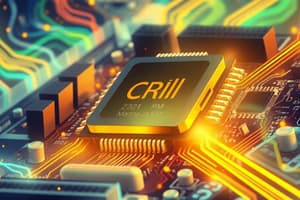Podcast
Questions and Answers
What is the primary function of input devices?
What is the primary function of input devices?
- To accept data and instructions from users (correct)
- To communicate with other computers
- To store information permanently
- To process data and deliver output results
Which type of software manages the hardware and software of a computer?
Which type of software manages the hardware and software of a computer?
- Application Software
- System Software (correct)
- Malware
- Utility Software
Which of the following is an example of output devices?
Which of the following is an example of output devices?
- Projector (correct)
- Scanner
- Touchscreen
- Microphone
What best describes application software?
What best describes application software?
Who is included in the category known as peopleware?
Who is included in the category known as peopleware?
What is the primary role of the Arithmetic and Logic Unit (ALU) within the Central Processing Unit (CPU)?
What is the primary role of the Arithmetic and Logic Unit (ALU) within the Central Processing Unit (CPU)?
Which type of memory is considered volatile and loses its data when power is turned off?
Which type of memory is considered volatile and loses its data when power is turned off?
How do primary and secondary memories primarily differ in terms of data retention?
How do primary and secondary memories primarily differ in terms of data retention?
Which of the following is an example of secondary memory?
Which of the following is an example of secondary memory?
What characteristic makes secondary memory generally less expensive compared to primary memory?
What characteristic makes secondary memory generally less expensive compared to primary memory?
Flashcards are hidden until you start studying
Study Notes
Hardware Components
-
Hardware refers to the physical parts of a computer system.
-
System Unit (Central Processing Unit):
- Acts as the “brain” of the computer, processing all user commands.
- Examples of processors include Intel, Athlon, and SPARC.
- Contains the ALU (Arithmetic and Logic Unit), responsible for arithmetic and logical operations.
- Includes registers, which temporarily store and execute instructions.
-
Memory:
- Serves as the storage device for data and instructions needed by the CPU.
- Divided into two categories:
- Main Memory (Primary Memory):
- Known as RAM (Random Access Memory).
- Volatile storage, meaning data disappears when power is lost.
- Functions as a “waiting area” for executed data and instructions.
- Secondary Memory:
- Non-volatile storage, retaining data and programs long-term.
- Examples include hard disks, flash drives, CDs, DVDs, and magnetic tapes.
- Primary memory is faster, more expensive, but lower in capacity; secondary memory is slower, cheaper, but higher in capacity.
- Main Memory (Primary Memory):
-
Input Devices:
- Accept data and instructions from users.
- Examples include keyboard, mouse, touchscreen, stylus, scanner, and microphone.
-
Output Devices:
- Display or store results after processing data.
- Examples include monitors, projectors, speakers, and printers.
Software
- Software comprises a set of programs or instructions that guide the computer’s operations.
- Categorized into two main types:
- System Software:
- Programs that manage hardware and software resources.
- Operating systems (e.g., Windows, Macintosh, UNIX) are common examples.
- Application Software:
- Specialized programs designed for specific user tasks.
- Examples include word processors, spreadsheets, databases, and graphic software.
- System Software:
Peopleware
- Refers to the individuals and teams that use the computer system.
- Includes developers, programmers, and end users who interact with the technology.
Studying That Suits You
Use AI to generate personalized quizzes and flashcards to suit your learning preferences.




